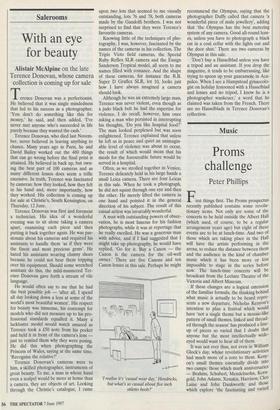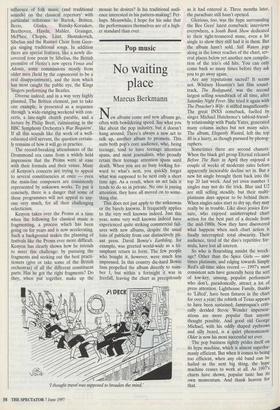Music
Proms challenge
Peter Phillips
First things first. The Proms prospectus recently published contains some revolu- tionary items. Not only are some of the concerts to be held outside the Albert Hall (which used, of course, to be a regular arrangement years ago) but eight of these events are to be at lunch-time. And two of those which are taking place in the Hall will have the artists performing in the arena, to reduce the distance between them and the audience in the kind of chamber music which it has been more or less impossible to stage in the series before now. The lunch-time concerts will be broadcast from the Lecture Theatre of the Victoria and Albert Museum.
If these changes are a logical extension of the familiar formula, the thinking behind what music is actually to be heard repre- sents a new departure. Nicholas Kenyon's intention to plan a festival which would have 'not a single theme but a mosaic-like pattern of small themes, linked and thread- ed through the season' has produced a line- up of pieces so varied that I doubt that anyone but the most intellectually wide- eyed would want to hear all of them. . It was not ever thus, not even in William Glock's day, whose revolutionary activities had much more of a core to them. Keny- on's small themes essentially divide into two camps: those which mark anniversaries — Brahms, Schubert, Mendelssohn, Korn - gold, John Adams, Xenakis, Harrison, Cleo Laine and John Danlcworth; and those which explore 'the fascinating and varied influence of folk music (and traditional sounds) on the classical repertory' with particular reference to Bartok, Britten, Berio, Glinka, Rimslcy-Korsakov, Beethoven, Haydn, Mahler, Grainger, McPhee, Chopin, Liszt, Shostakovich, Sibelius and the Rustavi Choir from Geor- gia singing traditional songs. In addition there are special features, like a newly dis- covered tone poem by Sibelius, the British premiere of Henze's new opera Venus and Adonis, some commissions mostly from older men (held by the cognoscenti to be a real disappointment), and the item which has most caught the public eye, the Kings Singers performing the Beatles.
Diverse indeed; and in a way very highly planned. The Britten element, just to take one example, is presented as a sequence through 'a wide-ranging weekend with con- certs, a late-night church parable, and a lecture by Philip Brett, culminating in the BBC Symphony Orchestra's War Requiem'. If all this sounds like the work of a well- educated civil servant, the question certain- ly remains of how it will go in practice.
The record-breaking attendances of the Drununond era came from a widely held impression that the Proms were at ease with their formula and their venue. Many of Kenyon's concerts are trying to appeal to several constituencies at once — even the main-line composers are consistently represented by unknown works. To put it concisely, there is a danger that some of these programmes will not appeal to any- one very much, for all their challenging eclecticism.
Kenyon takes over the Proms at a time when the following for classical music is fragmenting, a process which has been going on for years and is now accelerating. Such a background makes the planning of festivals like the Proms ever more difficult. Kenyon has clearly shown how he intends to meet this challenge: by pursuing the fragments and seeking out the best practi- tioners (give or take some of the British orchestras) of all the different constituent parts. Has he got the right fragments? Do they, when put together, make up the mosaic he desires? Is his traditional audi- ence interested in his pattern-making? Per- haps. Meanwhile, I hope for his sake that the performances themselves are of a high- er standard than ever.











































































 Previous page
Previous page